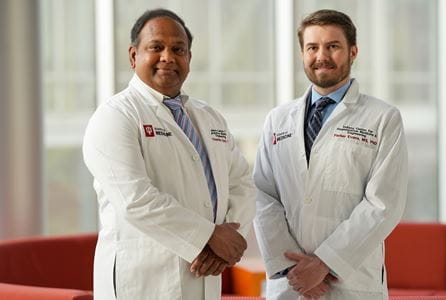Interdisciplinary study expected to spur industry job growth, medical innovations
INDIANAPOLIS—Indiana University School of Medicine is launching a new Master of Science and PhD in Regenerative Medicine and Technologies (RMAT), the only degree program of its kind in the state of Indiana.
The Indiana Commission for Higher Education recently approved the new MS/PhD program, which is the final approval step required before launching. The master’s program complements IU School of Medicine’s PhD program in Regenerative Medicine and Technologies, which was approved in 2020, where students develop the knowledge and industry-specific skills required to augment medicine-based innovations, regulatory science and supply chain management. Both are directed by faculty in the Indiana Center for Regenerative Medicine and Engineering, which is nested in the Department of Surgery.
“The Regenerative Medicine and Technologies graduate program provides an extraordinary opportunity for students to train in the emergent field of regenerative medicine which has the clear potential to transform health care in the near future. Special emphasis is directed at industry partnership and workforce development to cater to the growing needs of a fast-developing industry,” said Chandan K. Sen, PhD, associate vice president of military and applied research, the J. Stanley Battersby chair and professor of surgery and director of the ICRME at IU School of Medicine. “Graduate students will undergo a rigorous curriculum and immerse themselves in practical applications that will prepare them for the expanding job market in regenerative medicine, engineering and advanced manufacturing.”
Regenerative medicine scientists seek to replace or regenerate human cells, tissues and organs so doctors can someday help more patients establish, restore or enhance function to affected areas. According to MarketWatch, the global regenerative medicine market has a current value of $13.3 billion in 2022 and is expected to increase to $38.7 billion by 2031.
The United States Bureau of Labor Statistics predicts employment of medical scientists nationally will grow 17% between 2020 and 2030, compared to an 8% growth for all occupations. They estimate 3,200 job openings for biochemists and biophysicists will be available annually. In Indiana, the Indiana Department of Workforce Development’s 2018-2028 employment projections predict a 7% increase of medical scientists and a 13% increase in biochemists and biophysicists. Median salaries could range between $80k - $124K.
“Regenerative medicine is growing rapidly and we are proud to be a global leader in training the next generation of researchers in this exciting field,” said Jay L. Hess, MD, PhD, MHSA, dean of IU School of Medicine and IU’s executive vice president for university clinical affairs. “The RMAT program leverages the resources and expertise at Indiana University and Purdue University to provide robust training for these future scientists.”
Students enrolled in the new MS/PhD program will receive an introduction to translational research with a curriculum emphasizing applied sciences and technology, device and therapy manufacturing, regulatory compliance, and a required industrial or clinical internship. Students must complete a minimum of 30 credit hours, which will take a full-time student two years to complete. They may also have internship opportunities at Indiana life sciences companies that focus on regenerative medicine. International internship opportunities also exist with partners in India and Europe.
This program is designed to bring together physicians, biomedical researchers, medical residents, and Bachelor of Science graduates who are interested in life and technical sciences. United States military personnel interested in military medicine and RMAT PhD students who wish to exit with a master’s degree are encouraged to enroll given ICRME’s track record in military medicine.
Learn more about the graduate degree programs in regenerative medicine, including curriculum information and the application process.
What they’re saying:
“Right now, there is a deficit of people that are specifically trained toward regenerative medicine, and it’s making it challenging for people who run these businesses. If graduates can be prepared with an industrial-focused curriculum, they will be in a better position to adapt and be a stronger contributor to a life sciences company, which will make everything more efficient and self-sustaining.” -Erik Woods, PhD, HCLD (ABB), co-founder, executive vice president and chief science officer for Ossium Health, Inc.
“The fusion of engineering and medicine is becoming closer and closer. We are always looking for bright graduates who have a high degree of engineering skills and medical knowledge. We like to hire master’s level graduates and continue to train them to become good development engineers or good regulatory scientists. This master’s in regenerative medicine and technologies program is another opportunity for Indiana to lead medicine into a new realm that’s a hybrid between medical devices and overall engineering of tissues.” -Mike Hiles, PhD, senior vice president and chief scientific officer, Cook Biotech, Inc.
###
IU School of Medicine is the largest medical school in the U.S. and is annually ranked among the top medical schools in the nation by U.S. News & World Report. The school offers high-quality medical education, access to leading medical research and rich campus life in nine Indiana cities, including rural and urban locations consistently recognized for livability.




